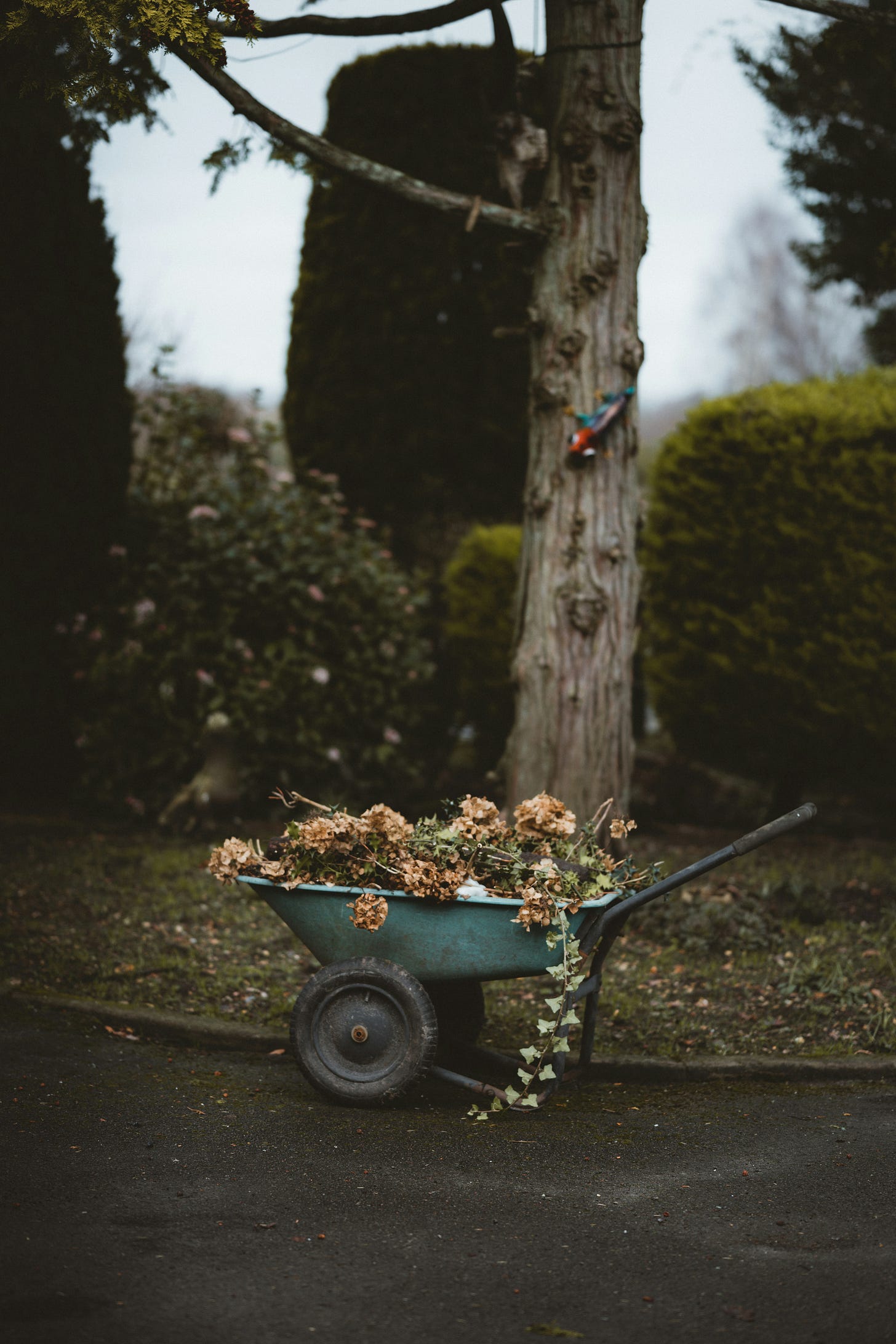Love Hurts, So Does Pruning
Maybe God is pruning back good things so we have room for something better?
Photo Credit: Unsplash
I’m deep in writing mode for my next book (on the Gospel of John!), but in writing not everything makes the cut. As I explore themes and ideas, I may write about ones that don’t fit the scope of the book from time to time. For the last few weeks, I’ve been deep in John 13-17, where Jesus addresses his friends for the last time before his journey to the cross. If you’re ever struggling with understanding Christ’s purpose for you and heart towards you, John 13-17 is a good place to camp out.
One of the things Jesus tells his friends is that he is the true vine and they are the branches (John 15:1). Then he goes on to talk about the process of growth (sanctification) that comes from abiding in the vine (John 15:2). But along with abiding, branches need additional help. You probably have seen a vine run amuck. It gets in the way of everything. And a branch that is overgrown rarely has fruit growing on it.
In John 15, Jesus writes that he prunes the branches so they would bear more fruit. In other words, Jesus cuts back existing growth (fruit), so more can emerge. He prunes us so something better grows in its place. Pruning, though, is a rough process. When God prunes us, he’s usually stripping us bare. He’s taking something from us or leading us through a valley. By definition, a season of pruning is a season of no discernible fruit.
In her book Overflowing Joy, Tara Dew talks about pruning and its effects. She writes:
Pruning is simply when a gardener cuts back superfluous, extra, or unwanted parts of a plant. It is a way to train and discipline a plant in the way that the gardener wants it to grow. Pruning is for the plant’s good, health, and beauty. To the inexperienced eye, pruning can look a lot like loss.[1]
I’ll be honest, pruning is not my favorite. It’s not fun to be bare and exposed to the elements, while the evidence of your previous fruitfulness lies on the ground around you. Pruning leaves you wondering if you’ll ever bear fruit again.
Pruning requires you to trust the process.
Dew goes on to write:
When a gardener prunes, he has a purpose in that pruning: It stimulates new healthy growth in the plant. Jesus says in John 15:2, “He prunes every branch that produces fruit so that it will produce more fruit.” MORE fruit is the goal of the gardener.[2]
Jesus says that in pruning, better fruit is coming. But what we feel in pruning is that our fruit-bearing days are behind us. What we feel in pruning is that the Gardener is displeased with us, so he punishes us by cutting off all the fruit we worked so hard to cultivate. What we feel in pruning is abandonment.
But pruning requires you to trust the Gardener, and to continue abiding in the Vine when no fruit seems possible. Dew goes on to write that the Gardener is never more intimate with us than when he’s pruning us (26). Pruning requires him to get close, to grab hold of the branch and discern which one needs pruning. He can’t prune at a distance. He can only prune us when he’s drawn near.
Jesus left no stone unturned in his final moments with his friends. He made sure every future struggle was covered, and we know from the rest of the New Testament that hard days awaited them. They would have incredibly fruitful ministries, but they also would have deep valleys of pruning. They needed to know that neither were dependent on their capacity or their own health. The Father is the Gardener and his Son is the Vine—his people are tender branches that need all the help they can get.
The world we’re in, both Christian and not, place value on results. There is a place for that because even Jesus acknowledges that a fruitless branch is a fake one. But I think Jesus is deeply concerned with comfort here in John 15. I once heard someone say that the Christian experience is one where we’re the “underdog.” Suffering is a given, not an exception. Persecution is to be expected. Dry seasons are agony, but not abnormal. When those moments come, you need assurance that God isn’t doling out punishment, but instead lovingly pruning back even the most fruitful branches so more fruit will come.
Isn’t that transformative in our suffering? When we lose a beloved ministry opportunity, or a discipleship relationship ends abruptly, or we can’t find a job, maybe God is pruning back good things, so we have room for the better.
Pruning isn’t a mark of his absence. It’s a mark of his deep and intimate presence when his tender branches. And even when the fruit is sparse or completely cut off, the pruning assures us that better fruit is coming.
[1] Overflowing Joy, Tara Dew, 15
[2] Dew, 16







Very much needed this reminder today. Saving this to re-read later!